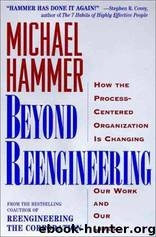Beyond Reengineering: How the Process-Centered Organization Is Changing Our Work and Our Lives by Michael Hammer

Author:Michael Hammer
Language: eng
Format: mobi, epub
Tags: Development, Management, Organizational Behavior, Reengineering (Management), Organizational change, Entrepreneurship, Leadership, Industrial organization, Structural Adjustment, Business Development, General, Business & Economics
ISBN: 9780887308802
Publisher: HarperCollins
Published: 1997-08-07T19:53:16.973000+00:00
PART III
ENTERPRISE
CHAPTER 10
THE SOUL OF A NEW COMPANY
A CORPORATION is more than a collection of processes, more than a set of products and services, even more than an association of people at work. It is also a human society, and like all societies, it nourishes particular forms of culture—“corporate cultures.” We’re all familiar with this notion. Every company has its own language, its own version of its history (its myths), and its own heroes and villains (its legends), both historical and contemporary. The whole flourishing tangle serves to confirm old-timers and to induct newcomers in the corporation’s distinctive identity and its particular norms of behavior. In myriad ways, formal and informal, it tells them what is okay—and what is not.
Despite their many differences, there are great similarities across most contemporary corporate cultures. Certain themes resonate almost everywhere: avoiding blame and responsibility, treating co-workers as competitors, feeling entitled, and not feeling intense and committed. This commonality is hardly surprising. After all, most of today’s corporations were born and raised in the same business environment, subject to the same pressures and issues. And because nurture definitely dominates nature in the business world, most companies, facing a common context, developed a common culture.
The key feature of the environment in which most contemporary organizations came of age is that, by and large, for the last two hundred years demand exceeded supply. It would be an exaggeration to say that corporate growth in this era was purely demographic—a simple matter of the growing numbers and purchasing power of consumers—but it wouldn’t be much of one. On the whole, from the last quarter of the eighteenth century to the last quarter of the twentieth century, producers have consistently had the upper hand over consumers. Except during downturns in the business cycle, there were always more people—or companies—who wanted to buy than there were goods or services to satisfy them. Whether it was automobiles, telephone service, or soft drinks, the dominant concern for the modern corporation has been to keep up with apparently insatiable demand.
This demand shaped the world’s business environment and shaped virtually everything about corporate cultures. The corporate way to success was not to innovate—that was the job of the entrepreneur—but to harness an earlier innovation and to ramp it up in scale in order to meet demand that could safely be assumed to be waiting. The primary goal was not making mistakes. With a market waiting to be taken, brilliance and innovation were unnecessary; caution and plodding could be counted on to carry the day. So why take risks? The highest values were those of planning, control, and discipline—the values needed to capitalize on a ready market.
This business context fostered company cultures that were strangely at odds with America’s independent and democratic spirit. You might suppose that nothing could go more against the American grain than having to make a career, or at least a living, in organizations that were at once paternalistic, controlling, and bureaucratic. Here was a hat trick, if there ever
Download
Beyond Reengineering: How the Process-Centered Organization Is Changing Our Work and Our Lives by Michael Hammer.epub
This site does not store any files on its server. We only index and link to content provided by other sites. Please contact the content providers to delete copyright contents if any and email us, we'll remove relevant links or contents immediately.
| Agile | Lean |
| Quality Control | Six Sigma |
| Total Quality Management |
Hit Refresh by Satya Nadella(9133)
The Compound Effect by Darren Hardy(8966)
Change Your Questions, Change Your Life by Marilee Adams(7780)
Nudge - Improving Decisions about Health, Wealth, and Happiness by Thaler Sunstein(7706)
The Black Swan by Nassim Nicholas Taleb(7129)
Deep Work by Cal Newport(7083)
Rich Dad Poor Dad by Robert T. Kiyosaki(6632)
Daring Greatly by Brene Brown(6513)
Principles: Life and Work by Ray Dalio(6447)
Playing to Win_ How Strategy Really Works by A.G. Lafley & Roger L. Martin(6304)
Man-made Catastrophes and Risk Information Concealment by Dmitry Chernov & Didier Sornette(6019)
Big Magic: Creative Living Beyond Fear by Elizabeth Gilbert(5771)
Digital Minimalism by Cal Newport;(5764)
The Myth of the Strong Leader by Archie Brown(5507)
The Slight Edge by Jeff Olson(5417)
Discipline Equals Freedom by Jocko Willink(5389)
The Motivation Myth by Jeff Haden(5212)
The Laws of Human Nature by Robert Greene(5208)
Stone's Rules by Roger Stone(5087)
